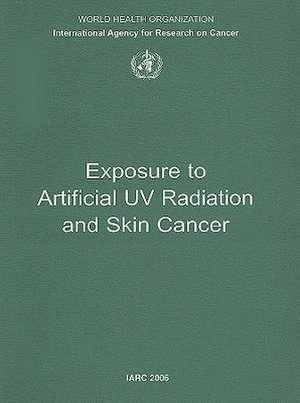Exposure to Artificial UV Radiation and Skin Cancer: IARC Working Group Reports, cartea 01
Autor Iarcen Limba Engleză Paperback – 30 noi 2006
Preț: 99.16 lei
Preț vechi: 104.38 lei
-5% Nou
Puncte Express: 149
Preț estimativ în valută:
18.97€ • 20.68$ • 15.99£
18.97€ • 20.68$ • 15.99£
Comandă specială
Livrare economică 02-16 aprilie
Doresc să fiu notificat când acest titlu va fi disponibil:
Se trimite...
Preluare comenzi: 021 569.72.76
Specificații
ISBN-13: 9789283224419
ISBN-10: 9283224418
Pagini: 64
Dimensiuni: 178 x 234 x 5 mm
Greutate: 0.2 kg
Editura: World Health Organization
Seria IARC Working Group Reports
ISBN-10: 9283224418
Pagini: 64
Dimensiuni: 178 x 234 x 5 mm
Greutate: 0.2 kg
Editura: World Health Organization
Seria IARC Working Group Reports
Notă biografică
The International Agency for Research on Cancer (IARC) is part of the World Health Organization. IARC's mission is to coordinate and conduct research on the causes of human cancer, the mechanisms of carcinogenesis, and to develop scientific strategies for cancer control. The Agency is involved in both epidemiological and laboratory research and disseminates scientific information through publications, meetings, courses, and fellowships.
